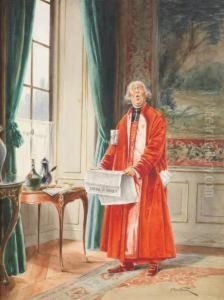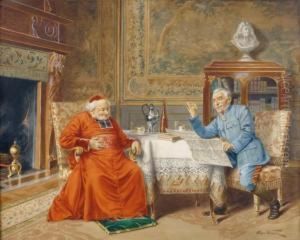Alfred Weber Paintings
Alfred Weber was a German economist, sociologist, and theorist of culture whose work was influential in the development of modern economic geography. Born on July 30, 1868, in Erfurt, Thuringia, Germany, he was the younger brother of the better-known sociologist Max Weber. Alfred Weber studied at the universities of Berlin, Göttingen, and Heidelberg, and he received his doctorate in economics in 1897 from the University of Berlin.
Weber made significant contributions to sociology and economics, particularly through his research on industrial location theory. His most famous work, 'Über den Standort der Industrien' (Theory of the Location of Industries), published in 1909, examined the factors that determine the optimal location for manufacturing. His theory emphasized the importance of transportation costs, labor costs, and agglomeration effects in the decision-making process of industrial location. Weber's work laid the groundwork for the field of regional science and urban economics.
In addition to his economic theories, Alfred Weber was also interested in culture and history. He developed the concept of 'Kultursoziologie' (cultural sociology), which aimed to understand the cultural aspects of social life and their impact on economic and social development.
Throughout his career, Weber held academic positions at several German universities, including the University of Prague and the University of Heidelberg, where he spent a significant portion of his career. After the rise of the Nazi regime in Germany, Weber was an outspoken critic, and his teachings faced increasing restrictions.
Despite the political turmoil of his time, Alfred Weber continued to write and lecture. After World War II, he played a part in the re-establishment of a democratic society in Germany and was involved in the cultural reconstruction of the country. Alfred Weber passed away on May 2, 1958, in Heidelberg, Germany.
His legacy includes not only his theoretical contributions to economics and sociology but also his commitment to understanding the complex interactions between economy, society, and culture. His interdisciplinary approach has influenced subsequent generations of economists, sociologists, and urban planners.




























